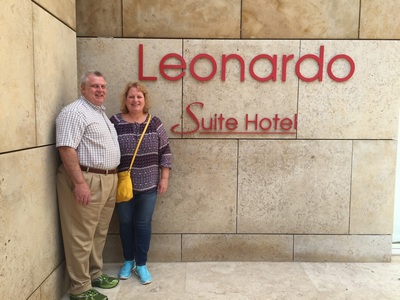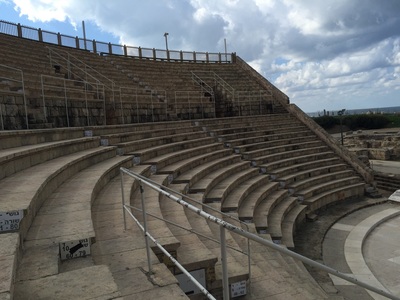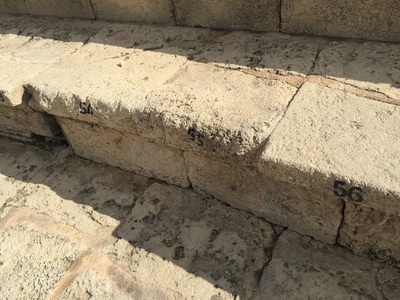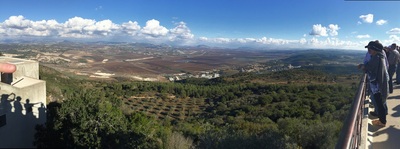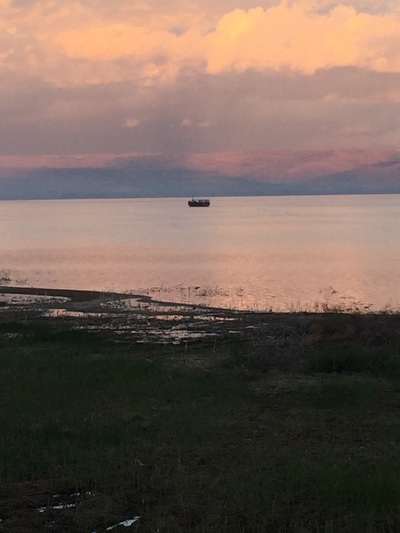|
Our next day in Israel dawned bright and early. Breakfast was at 7:00 a.m. and we had to be ready to board the bus at 7:45. An Israeli breakfast consists of about 10 varieties of salads, 4 varieties of fish (all with scales to meet kosher laws), eggs, yogurt, fruit, cheese and quite a few types of bread. Juices are very fresh but taste a little different. Coffee comes in two varieties: "Americano" and "Turkish." Americano tastes similar to what we are accustomed to in the States while the Turkish option would peel varnish. In a kosher restaurant, there is no milk or cream for coffee as that would violate the kosher laws.
After boarding the bus, we started for the city of Jaffa. Traveling up the coast of the Mediterranean Sea was enlightening. The sea is massive and the people with boats back in the days of Jesus basically sailed around the shore line. Once we got to Jaffa, we went to the house of Simon the Tanner. This was introduced to us as the "Best known Rooftop in Jaffa." This was based upon the vision Peter had as recorded in Acts 10:9-48. In that passage Peter "fell into a trance" (verse 10). There, God showed Peter a new focus in his life and he took the gospel to the Gentiles. Peter then witnessed to Cornelius and "many that were come together" (verse 27). After Peter spoke, both Jews and Gentiles were saved and the Holy Ghost was poured out on them (verse 45); a turning point that affected both you and I. From there, we went to the town of Caesarea Maritima or Caesarea "by the sea." Our stop there was at the Caesarea National Park. At this park was the palace of King Herod, the governor's house of Pontius Pilate, the amphitheater, and the large hippodrome built to race horses. Even though Jerusalem was the capitol of the Jewish world both King Herod and Pontius Pilate made their home at Caesarea and only went to Jerusalem for special events such as religious days. Our first stop was the amphitheater that Herod had built for productions put on for the citizens. This was also the location of the judgement tribunal seat and if you read in Acts 26, you will see the account of Paul standing before King Agrippa and Festus and declaring the Gospel to them. As I stood in the middle of this place, I could almost hear Paul say "King Agrippa, believest thou the prophets? I know that thou believest." Looking around, there were still original seats in the amphitheater that were there when it was built. Next, we went to the palace of King Herod where he had fresh water piped in over six miles from Mt. Carmel via a roman aqueduct. He also had a fresh water pool next to the Mediterranean Sea. In some of the reclamation of the ruins, a tablet was uncovered with the inscription of the name of Pontius Pilate and dedicated to Tiberias Caesar who nominated him as procurator. This is important evidence of putting Pilate in Caesarea in the time of Jesus. Next, we climbed to one of the higher peaks in Israel: Mt. Carmel. On the way up, we stopped at a "Druze" restaurant. The Druze are a people that claim no sovereignty and therefore get along with just about anyone. They are former Muslims that are now loyal to Israel, good business people, and actually serve in the Israeli army. Since they believe in reincarnation, they are known as fierce fighters. They marry within their own people and you cannot "become" a Druze. I tried something called "Falafel" and the jury is still out on that one. Mt. Carmel was the sight of the account of the showdown between Elijah and the prophets of Baal. You can also see across the Valley of Jezreel in the lower region of Galilee. As you know I have a fondness for the book of Revelation and have studied it extensively but I was unprepared for what I saw. The valley was vast and when you read about the gathering of the armies that takes place here during the battle of Armageddon and the defeat of the enemies of God, it is empowering to know that the God we serve is a mighty God that answers to no one and conquers all. We came down from the mountain and went to the Nof Ginossar Hotel located in a kibbutz (a type of communal settlement) in Tiberias, Israel. We are going to be here for a couple of nights. Things are a little different at a kibbutz. I cannot say I fully understand the communal lifestyle but I am always observing and learning. Tomorrow, we start at 7:15 a.m. on a boat on the Sea of Galilee. I have no plans to challenge Peter for the title and appreciate the faith he had to step out of the boat. From there, we'll travel on to Capernaum, the Mount of Beatitudes, Caesara Phillipi (different from Caesarea Maritima), Kursi, and the Golan Heights. I will be delivering the morning devotion and preaching at the Mount of Beatitudes so specifically remember that in your prayers. We'll pray for you in return. Enjoy your coffee...more to come. Love you all, Pastor Gary Comments are closed.
|
AuthorGary W. Hall, Pastor of Mt. Olivet Baptist Church. Archive
January 2021
|

